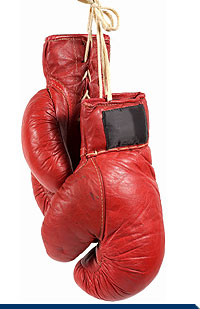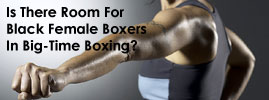 |
Choosing Your Right
Boxing Glove Size and Handwraps
When picking out a pair
of boxing gloves, choosing one that best fits
your hand is not exactly the right criteria
you should follow. Try putting on handwraps
underneath the gloves. 120" handwraps
are right for small hands. For medium to large
hands, you will want 170" or longer.
Why bother with handwraps?
When boxing, you will need to support your
wrist and thum to protect your bones and tendons
from injury. It is important that you always
wrap your hands before working out or boxing.
|
|
|
BOXING FOR
BETTER HEALTH: Do
you want the strength of undefeated boxer
Laila Ali or the body of heavyweight champion
Lennox Lewis? [ More
]
A KNOCKOUT WORKOUT:
Here's how you can do
it at home. [ More
] |
 |
|
Women's Boxing News
Is There Room For Black Female
Boxers In Big-Time Boxing? - Should There Be
Ebony, March, 2000 by Kimberly Davis
The debate outside the ring is often as heated as
the fights inside the ring.
LAILA Ali trains six clays a week. On those days,
she runs about four miles and goes to the gym. There,
she hits the speed bag, practices her footwork,
and laces up her boxing gloves to pound the heavy
bag and then do a few rounds of sparring.
The sweat is the same. And so is the blood. Professional
boxing knows no gender and doesn't discriminate
once you step through the ropes.
Showcasing supremely conditioned, trash-talking
athletes with swift punches and fancy footwork,
the sport is finding new warriors in African-American
women. And some of these athletes--from the upstarts
like Ali to the contenders and champions--are finding
a measure of success in the ring.
But there's also controversy, sparked by boxing
purists and spectators who believe that women should
not participate in such a violent sport. And those
feelings have prompted often heated debate about
whether there is or whether there should be room
for Black women in big-time boxing. The arguments
against women's boxing range from safety issues
to social issues. Some critics say that women's
bodies aren't built for boxing while others just
don't want to see women get hit. In some countries
there are laws against women's boxing.
On the other side, there is strong support for women
in boxing, with many fans believing that participants
should have the opportunity to win the big purse,
even if they carry a purse. "I wasn't too crazy
about [women's boxing] myself," says New Jersey
boxing promoter Diane Fischer, owner of Dee Lee
Promotions. "But I went out and I watched the
girls. They train just as hard as the men. Those
girls were fighting. They were good."
In the midst of all the fuss, Ali, who trains at
L.A. Boxing in Los Angeles, is learning the ropes.
Since October, she has stepped into the ring with
three opponents, all with a similar lack of experience,
and she won each bout by knockout. She'd like to
have the security and time anonymity would allow,
but that's impossible. She's an Ali, and she's a
boxer.
Although her name brought her instant recognition
as the daughter of former heavyweight boxing champion
Muhammad Ali, the 21-year-old knows she's just getting
started. The buzz about the 5-foot-10-inch, 168-pound
fighter can be distracting. Some fans attend her
fights to catch a glimpse of her famous father.
And yes, some are waiting to see if she'll fall
on her face. Still others are hoping to ignite old
rivalries. Jacqui Frazier Lyde, the 38-year-old
lawyer-daughter of famed boxer Joe Frazier, who
was Muhammad Ali's fiercest rival, has even challenged
the younger Ali to a fight. So far, Ali's camp has
declined.
"If I could, I would have loved to not have
been Laila Ali. I would have loved to have been
a person who is not Muhammad Ali's daughter, and
start boxing and get my experience. And then, once
I feel comfortable and get experience, come out
and have people watch me," says Ali, who's
been training for about 17 months. "People
started being in my face from the beginning of my
career, when I didn't know anything yet, and they
started trying to judge me. Really, it's just too
soon."
When it comes to shunning the spotlight, Ali is
in the minority. Other Black female boxers like
(Downtown) Leona Brown and Tiffany (Lady Logan)
would give anything for the opportunity to turn
down a televised fight and bask in the unparalleled
media attention. The best they can hope for at this
point is local success and some acclaim in boxing's
inner circle--where fans follow their favorite fighters
on the Internet or in boxing magazines or on the
occasional televised undercard of a major fight.
That's why these women have been training--and waiting--for
their shot at the big time. But even if you do have
the skills, with no name or gimmick to thrust you
to the head of the class, boxing insiders say it's
difficult to get the exposure needed for the big-money,
multimillion-dollar purses prevalent in big-time
men's boxing. Women's boxing is so young (recognized
by USA Boxing in 1993), experts say that it's difficult
to know who's going to break out of the pack and
turn it into a mega-sport. The public interest is
there, says Fischer, who's had a hard time breaking
into what she calls the "old boys' club."
The money, the endorsements, the credibility and
fairness are not.
"It's the same thing I've been getting as a
promoter," says Fischer. "And I've been
fighting it for three years."
Undoubtedly, women's boxing has grown, says Rick
Kulis, a boxing promoter and co-founder of the Torrance,
Calif.-based International Female Boxers Association
(IFBA). And much of that growth has taken place
over the past two years. In 1996, about 130 women
were registered as amateur boxers. Today, Kulis
says, there are more than 1,200 women who are boxing
for USA Boxing and Golden Gloves, the amateur proving
grounds. Frank Globuschultz, president and CEO of
the International Women's Boxing Federation, based
in Huntington, N.Y., estimates that about 30 percent
of the women boxers coming up today are African-American.
With such explosive growth in the sport, boxing
experts can only guess why sponsors and endorsers
are so reluctant to embrace women boxers the way
they have embraced women's basketball and soccer
players.
It may be the reluctance to agree that there's a
place for women in the ring, period. Boxing is a
sport long held to be traditionally male and the
specific medical risks to female boxers aren't yet
known. Then there are those who believe that if
women are going to get into the ring, the same rules
and regulations that apply to men should apply to
women. But there are some concessions to women in
the sport: Female boxers fight two-minute rounds
instead of the customary three-minute rounds; women
fighters wear a chest protector and must have mandatory
pregnancy tests before each fight.
Meanwhile, boxing purists don't want to see the
intensity of the sport diluted by sanctioned "catfights"
and brawls that involve less-than-skillful fighters.
Regardless of the naysayers, female boxers today
are breaking the stereotypes by engaging in much
more than "cat fights" and training just
as hard as the men. They want to be taken seriously.
At age 39, Downtown Brown, who lives in Pawling,
N.Y., and trains at the Hat City Boxing Club in
Danbury, Conn., is the two-time IFBA junior featherweight
champion. The nearly 5-foot, 118-pound fighter is
one of the few women who box full time. She is also
supremely confident and can talk trash with the
best of them.
Like many African-Americans in women's boxing, Brown
is struggling for recognition in a sport where,
she says, other, less-qualified women dominate media
coverage, not necessarily because of their skills,
but because they fight a man or pose nude in a men's
magazine. There's no doubt in Brown's mind that
she can make it to the big-time; she just has to
get the right opportunity, she says, and the right
money. "There's a lot of politics in this game,"
says Brown, who began boxing at age 36. "I'm
the two-time champion. I've got to start getting
paid like the two-time champion."
Lady Logan's story is similar. At 5 feet 9 inches
tall and weighing 183 pounds, she is ranked first
in the light heavyweight division by the IWBF. The
31-year-old mother of two has been boxing for about
three holds an amateur belt and is the IFBA World
Tough Woman champion Her goal, aside from finishing
her bachelor's degree, is to become the light heavyweight
champion of the world. She hopes the sport will
continue to grow, with more skillful fighters lending
more credibility to the sport. "If the bouts
are skillful and worthy: of being put on, then yes,
there's going to be a big boom," Logan says
from her home in Columbus, Ohio. "There are
thousands of women getting into this every year,
now. It's not dying out at all."
Kulis, who's also president of Event Entertainment,
says television will play a key role in giving women's
boxing the exposure that growth demands. On pay-per-view
and on cable, some women's bouts are being televised,
but not enough for the boxers to really develop
a following. "What women's boxing needs is
consistent presentation to the public on television,
so fighters can develop a following and loyalty,"
says Kulis, who founded the IFBA in 1997. And those
fans are "not seeing ill-equipped women in
the ring. They're seeing highly trained, non-stop
action that's every bit on the level of men's boxing."
Globuschultz, whom everyone calls "Frankie
G.," agrees, saying there's a lot of room at
the top for women's boxing. "Years ago, people
would say `Why do you want to box? There's no future,'"
says Globuschultz, owner of New York City's Academy
of Boxing for Women. "There is a future, now,
in women's boxing, and it will be there."
Ali believes that, ultimately, her contribution
to boxing will be positive. She knows she will be
a good fighter and hopes her time in the ring will
aid the sport.
"Women's boxing has a long way to go before
we [female boxers] really get the credibility that
we deserve," says the former fingernail technician.
"The fact that we have people who really don't
focus on boxing skills and just get into the ring
and brawl doesn't really help. But there are people
out there who work hard, are good fighters and really
know how to box. They are going to help the sport,
but it's going to take time."
COPYRIGHT 2000 Johnson Publishing Co.
COPYRIGHT 2000 Gale Group |
|